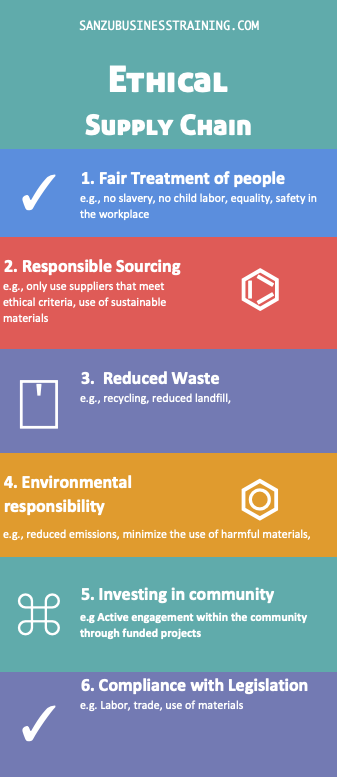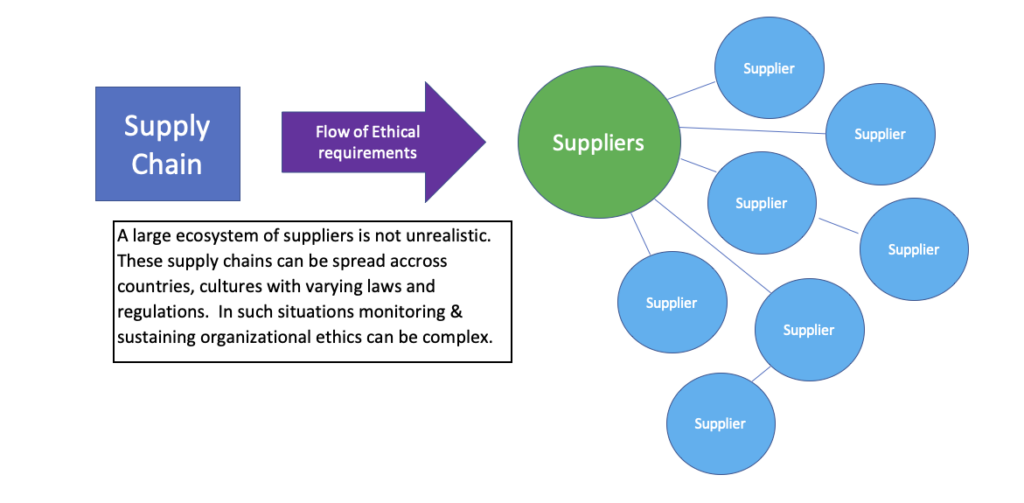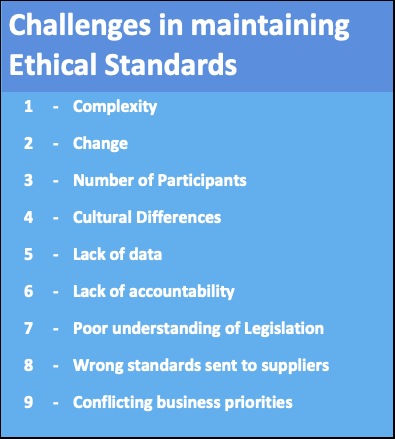An ethical supply chain is configured to balance the need for economic returns against social and environmental responsibilities.

An ethically focused organization directs its efforts towards processes that create products and/or services in a way that is built from the ethical treatment of its workforce and stakeholders while ensuring its production methods utilize environmentally sustainable materials and processes.
In today’s article, we’ll be covering the Ethical Supply Chain, including:
- What is an ethical supply chain
- Why implement an Ethical Supply Chain?
- Ethical Supply Chain Characteristics
- Why is the supply chain vulnerable to ethical lapses?
- Steps to an Ethical Supply Chain
- Benefits of an Ethical Supply Chain
- How to maintain ethical supply chain management
What is an Ethical supply chain?
An ethical supply chain balances the need to deliver business goals with social responsibility.
While many consider it merely a back-office function, the Supply Chain has a significant influence over ethics and social responsibility within a business.
An Ethical Supply Chain has several primary goals; these usually include
- Fair treatment of people
- e.g., no slavery, no child labor, equality, safety in the workplace
- Responsible sourcing
- e.g., only use suppliers that meet ethical criteria, use of sustainable materials,
- Reduced waste
- e.g., recycling, reduced landfill,
- Environmental responsibility
- e.g., reduced emissions, minimize the use of harmful materials,
- Investing in community
- Active engagement within the community
- Compliance with appropriate legislation

Goals are typically attributed to each area; for example, these may include:
- Ethical treatment of all workers throughout the supply chain e.g
- Fair pay,
- Access to education,
- Equality,
- No child labor,
- Safe working conditions, etc
- Sourcing materials from renewables or low impact sources
- No Bribery
- Reduced waste and high levels of recycling
- Reduce consumption of resources (such as power, water, etc.)
- Minimizing pollution
- Taking care of local communities.
- Being accountable and fixing issues should they emerge.
Through socially responsible and sustainable practices, businesses can produce better products AND be socially responsible and environmentally sustainable.
Why implement an Ethical Supply Chain?
It could be argued that the need for an ethical supply chain is threefold:
- Competitiveness – There is significant customer demand for demonstrable ethical conduct. Ethical behavior is now seen much in the same light as a product feature and decision factor when procuring services or products.
- Compliance with legislation – certain practices need to be in place to comply with legislation.
- Cost Savings & Efficiencies – certain Ethical behaviors and processes can lead to process efficiencies and cost reduction.
The first two on that list are significant. The pressure from consumers has increased substantially in recent years. Customers have considerable expectations over organizations they buy from. Price and availability are no longer the deciding factors; consumers are looking for organizations that can demonstrate appropriate ethics and alignment to sustainability issues.
Governments to are, through legislation, endeavoring to drive responsible behavior. Where a company might transact across international borders, these legislative requirements can become complex, requiring careful consideration.
Ethical Supply Chain Characteristics
It is insufficient to merely have ethical organizational goals. Consumers increasingly want to see demonstrable actions and results.
Supply Chains must demonstrate a set of ethical characteristics supporting their objectives that demonstrate action; these commonly include:
- Clearly identifiable social responsibility goals
- Clear prioritization of ethical behavior and processes
- Transparency
- Active leadership
- An organization that keeps its word
- Understanding the impact the organization has on its stakeholders
- Measuring goals in ethical impact as well as financial
- Understand that ethics, social and environmental responsibility do not stop at its own walls but extends to its suppliers and suppliers suppliers.
- Employing screening and monitoring processes to ensure goals are achieved
- Compliance against the appropriate legislature
- Actively participating in industry to drive ethical change
- Investing in change where required
Why is the supply chain vulnerable to ethical lapses?
The scale of today’s supply chains can be vast, this can make reaching goals challenging.
For example, let’s consider large multi national brands such as Apple, Wallmart, Amazon. An ecosystem of 100,000+ suppliers is not unrealistic. These supply chains are spread accross countries, cultures with varying laws and regulations. They are not alone.

While establishing ethical goals and objectives is a relatively simple matter, achieving ethical behavior throughout the supply chain is complex.
Despite efforts to the contrary, organizations are still found with supply chains that can be deemed unethical.
Most supply chains are intricate, large, and multi-layered.
Many organizations employ low-cost sourcing techniques which will involve counties with differing standards. These countries and geographical regions can be notoriously challenging to monitor.
Many organizations will utilize suppliers who themselves have complex supply chains stretching across geographical boundaries.
The challenges in maintaining ethical standards without due process can be significant. These can include

- Complexity (geographical and cultural) of most modern supply chains
- Frequent change
- Number of Participants including multi-tier supply chain
- Cultural differences
- Insufficient ethical information captured as part of the process
- Lack of accountability
- Lack of understanding of legislation
- Unable to keep up with changes within the supply chain
- Lack of standards flowed out to suppliers.
- Conflicting business priorities & goals (i.e., low-cost sourcing vs. ethical treatment of workers)
Steps to an Ethical Supply Chain
It is, however, even with these challenges, it is possible to drive ethical behaviors and processes; the steps to an ethical supply chain include
- Supply Chain Design – starting with the concept of how your supply chain will operate from structure, procedures, and policies – ethics needs to be hardwired in
- Compliance – Effective resources, policies, and processes must be in place to drive compliance with an understanding this will not stand still but continue to evolve.
- Supplier screening – appropriate due diligence must be in place on suppliers (and their supply chains) with clear rules and policies around what is acceptable.
- Ongoing Risk Assessment – Highlight possible vulnerabilities and draw appropriate action plans
- Tracking & monitoring – Businesses must put in place processes and systems that track and monitor requirements of its supply chain
- Triage – Processes should be in place to deal with breaches of policies and processes, whether that’s internally or from within its supplier ecosystem. Where issues exist that cannot be rectified, businesses must have processes that drive change.
- Change and transform – Businesses must embrace the benefits that ethics can bring. A clear transformation program should be established, which includes published steps and clear accountability.
Benefits of an Ethical Supply Chain
Aside from the obvious benefits of doing the right thing, there are three key benefits:
- Alignment to customer values (maintaining competitiveness)
- Protect brand reputation,
- Build long-term loyalty,
- Provide a better customer experience.
- Meeting regulatory requirements e.g.
- Modern Slavery Act (UK)
- Trade Facilitation and Trade Enforcement Act (US)
- EU 2021 Conflict Minerals Directive
- Efficiency and effectiveness of the supply chain
- Reduce cost
- Provide context for new products
How to maintain ethical supply chain management
What you can do to maintain ethical standards is a good question. I think it relies on several factors
- Commitment from management
- Having clear, achievable goals
- Having a clear plan on how to achieve those goals
- Having accountable resources responsible for delivery
- Not just paying lip service to the concept but taking practical steps to implement
- Investing in monitoring programs
- Implementing change when things go wrong
- Effective use of technology to capture information as well as data
Summary
Ethical supply chains are of primary importance to a modern business.
They can be challenging to establish due to the fragmentation and complexity of suppliers and stakeholders across geographical boundaries encompassing different cultures.
Getting it right can drive key benefits. However, customers do not just want promises but providing clear evidence of delivery.
What has your organization done to build an ethical supply chain? Has it adopted key processes and policies? How has it tackled maintaining compliance across its supplier base?
As ever we’d love to hear from you in relation to this article. You can reach us on Twitter (@sanbustrain) or via the comments section below.
This article is part of our Supply Chain Guide.